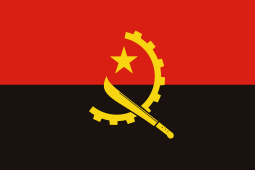Media of Angola
| Part of a series on the |
| Culture of Angola |
|---|
 |
| History |
| People |
| Languages |
| Cuisine |
| Religion |
| Art |
| Literature |
|
Music and performing arts |
| Sport |
|
Monuments |
|
Symbols |
|
The Media in Angola is primarily controlled by Angola's dominant political party, the People's Movement for the Liberation of Angola (MPLA), led by José Eduardo dos Santos, the country's president.
Journalism
The country's official news agency is the government-owned Angola Press Agency (ANGOP), founded in 1975, and formerly allied with the official news agency of the Soviet Union, the Telegraph Agency of the Soviet Union (TASS).[1] "The press was nationalized in 1976."[2]
In 2005, the only national daily newspaper was the government-owned Jornal de Angola (circulation in 2000 was 41,000). There were at least seven private weekly publications with circulation in the low thousands. Angolan newspapers include:
Telecommunications
Television and radio
Rádio Nacional de Angola broadcasts in Portuguese, English, French, Spanish, and major local languages; government-owned, it is the only station with the capacity to broadcast nationwide. In 2004, there were five commercial radio stations, including the Catholic Church’s Radio Ecclesia and Radio Lac Luanda. The only television station was the government Angola Public Television E.P. (TPA), which broadcasts in Luanda and most provincial capitals. In 2003, there were an estimated 78 radios and 52 television sets for every 1,000 people. TV Zimbo in a rival privately owned channel in Angola. On December 16, 2015, a new private TV station, Palanca TV, began broadcasting from the South African satellite subscription TV provider DStv.[7]
Internet
In 2003, the country had about 17 Internet hosts. The same year, there were 1.9 personal computers for every 1,000 people and three out of every 1,000 people had access to the Internet.
Censorship
Though a constitution provides for basic freedom of speech and press, the government is said to restrict these freedoms in practice.[1] Journalists are intimidated into practising self-censorship, and the government tightly restricts the main newspapers, television stations, and radio broadcasts.[8]
See also
References
- 1 2 Oyebade, Adebayo (2007). Culture and Customs of Angola. Westport, Connecticut: Greenwood Publishing Group. pp. 71–72. ISBN 978-0-313-33147-3. Retrieved January 22, 2010.
- ↑ "Angola: Media and Publishing". Encyclopædia Britannica. Retrieved 10 June 2017.
- 1 2 3 4 5 6 "Angola Profile: Media". BBC News. Retrieved 10 June 2017.
- ↑ "Archived copy". Archived from the original on 2003-03-14. Retrieved 2009-12-12.
- ↑ recipes, ink, cookbook,. "Jornal de Angola". Retrieved 2017-07-10.
- ↑ "semanarioangolense.net". www.semanarioangolense.net. Retrieved 2017-07-10.
- ↑ "Palanca TV estreia na DStv" (in Portuguese). DSTV.com. 31 Dec 2015. Retrieved 2 Feb 2016.
- ↑ "Angola | Country report | Freedom of the Press | 2013". www.freedomhouse.org. Retrieved 2017-07-21.
Bibliography
- "Angola: Directory: the Press". Africa South of the Sahara 2004. Regional Surveys of the World. Europa Publications. 2004. p. 62+. ISBN 1857431839.
- Historical Dictionary of Angola (2nd ed.), USA: Scarecrow Press (published 2011), 2011-05-05, ISBN 9780810871939 (Includes information about newspapers, radio, tv)
- Rita Figueiras; Nelson Ribeiro (2013). "New Global Flows of Capital in Media Industries after the 2008 Financial Crisis: The Angola–Portugal Relationship". International Journal of Press/Politics. 18 (4): 508. doi:10.1177/1940161213496583.
- Toyin Falola; Daniel Jean-Jacques, eds. (2015). "Angola: Media". Africa: an Encyclopedia of Culture and Society. ABC-CLIO. ISBN 978-1-59884-666-9.
- "Angola", Freedom of the Press, USA: Freedom House, 2016, OCLC 57509361
External links
- Karen Fung, African Studies Association (ed.). "News (by country): Angola". Africa South of the Sahara. USA – via Stanford University.
Annotated directory